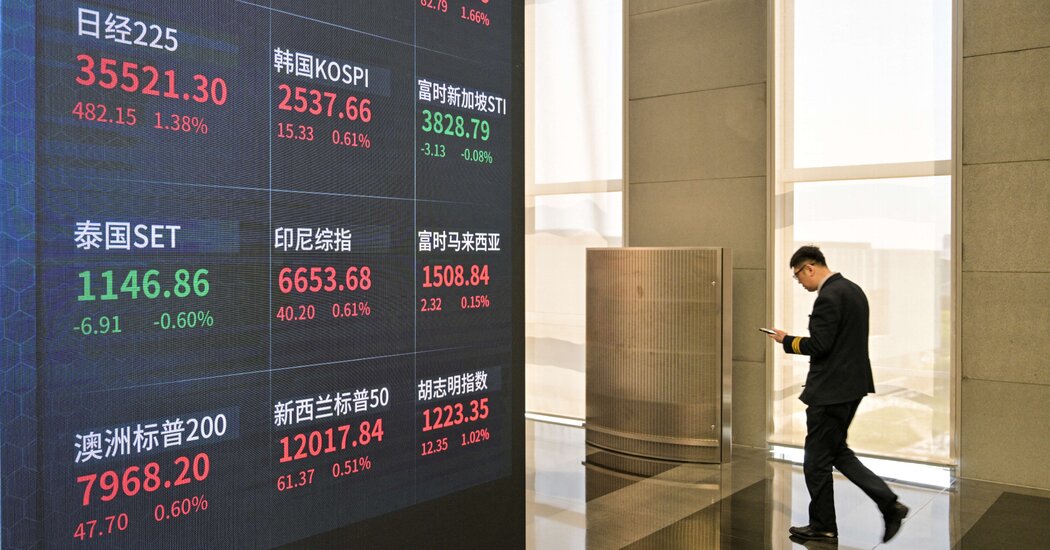The stock market recorded a weekly gain, as investors latch on to any signs of easing trade tensions.
The S&P 500, which was roughly flat in early trading on Friday before rising 0.7 percent for the day, ended the week 4.6 percent higher. Still, the index remains sharply lower since President Trump returned to office.
The stock market has seen dramatic swings in recent days, with Wall Street grasping for scraps of information about tariffs, trade and other crucial issues that can shift from day to day. Monday saw a sharp sell-off fueled by Mr. Trump’s renewed attacks on Jerome H. Powell, the chair of the Federal Reserve, followed by four days of sizable gains.
On Friday, jittery traders were confronted with the latest in a stream of contradicting claims about trade negotiations and tariffs. The head of an American business group in China said that the Chinese government was considering exempting some products from its 125 percent retaliatory tariffs on U.S. goods. Michael Hart, president of the American Chamber of Commerce in China, said that the commerce ministry had canvassed businesses in China to identify U.S. imports that were crucial to supply chains and vulnerable to China’s new trade barriers.
For some companies, he said, “their business model would not work in China, and we would see them exit” if the trade war persisted long-term.
Also on Friday, the Chinese government reiterated that it was not engaged in trade negotiations with officials in Washington, pushing back against Mr. Trump’s claim that the U.S.-China talks were underway. “The United States should not confuse the public,” a spokesperson for the Ministry of Foreign Affairs said. Mr. Trump suggested in an interview with Time that he had been in touch with Xi Jinping, China’s president, and asserted that his team was in active talks with China on a trade deal.
The counterclaims followed reports in Chinese media outlets and on Chinese social media this week that Beijing would forgo retaliatory tariffs on some U.S.-made semiconductor-related products. The Chinese government has not announced any such policy.
The New York Times heard from hundreds of American business owners who said they had been stunned into paralysis by Mr. Trump’s barrage of tariffs. They are reassessing their product lines and supply chains and even putting their operations on hold. Businesses are rushing to cancel factory orders or halt shipping containers before they leave China, pausing capital investments and new hiring, and scaling back spending to the bare necessities.
In the United States, executives at consumer-oriented companies have said that worries and uncertainty about the global economy are dampening spending. On Thursday, PepsiCo cut its full-year guidance outlook, citing a reduction in consumer spending as well as the impact of higher global tariffs. Procter & Gamble, which makes household staples like Tide detergent, also cut its full-year outlook and said whiplash on tariff policy had factored into a “pause” in consumption.
“The consumer has been hit with a lot, and that’s a lot to process,” Andre Schulten, P&G’s chief financial officer, told analysts, citing tariff uncertainty and “divisiveness and nationalistic rhetoric.”
Indeed, on Friday came signs that Americans were feeling gloomier about the economy. An updated University of Michigan measurement showed consumer sentiment falling for the fourth consecutive month, with the looming effects of tariffs weighing on American households. Expectations for future business and finance conditions have fallen 32 percent since January, the survey found.
Some analysts cautioned that the stock market’s gains this week did not indicate that the fundamental economic concerns that had fueled its volatility had been resolved.
“The road back to record highs won’t be easy,” said Mark Hackett, the chief market strategist at Nationwide. “Markets are showing resilience, but still face the same persistent challenges, including tariff uncertainty and signs of an economic slowdown.”
Elsewhere in the markets:
-
Markets in Asia were broadly higher, with Japan’s Nikkei 225 gaining 1.8 percent and Taiwan’s benchmark index up 2 percent. In Europe, stocks gained ground.
-
Shares in Alphabet, Google’s parent company, rose 1.5 percent on Friday. On Thursday, the technology giant reported a large jump in quarterly profit. The tech-heavy Nasdaq Composite rose 1.3 percent on Friday.
-
The yield on 10-year Treasury bonds fell about five basis points, to 4.26 percent.
-
Oil futures wobbled, with Brent crude falling about 1 percent before inching higher, to roughly $67 a barrel.
-
Gold continued its slide, to around $3,300, after briefly reaching a record $3,500 an ounce on Monday.
Claire Fu and Siyi Zhao contributed research.
Danielle Kaye is a Times business reporter and a 2024 David Carr Fellow, a program for journalists early in their careers.
Meaghan Tobin covers business and tech stories in Asia with a focus on China and is based in Taipei.
The post Stocks Post a Weekly Gain, Carried by Hope for Easing Trade Tensions appeared first on New York Times.




